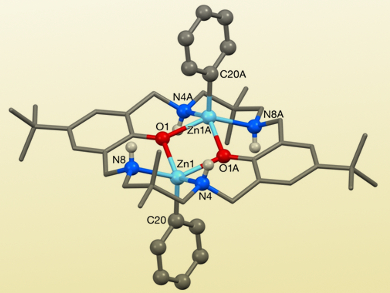Organometallic zinc compounds are attractive catalysts for various polymerizations, such as ring-opening copolymerizations (ROCOP) or ring-opening polymerizations (ROP). This is due to the compounds’ low toxicity, low cost, and lack of redox chemistry. As catalysts for the ROCOP of CO2 and epoxides, they can help to re-use captured CO2, and by controlling the nature of the bond between Zn and the initiating group or the polymer chain end, they enable the controlled synthesis of block copolymers from a monomer mixture.
Charlotte K. Williams, Oxford University and Imperial College London, UK, and colleagues have synthesized di-zinc-bis(phenyl) and di-zinc-bis(pentafluorophenyl) complexes (example pictured), which differ by the electron-withdrawing fluoryl substituents. The complexes were synthesized by combining a macrocyclic organic ligand with either ZnPh2 or Zn(C6F5)2.
The team investigated the complexes’ reactivity towards small molecules such as CO2, cyclohexene oxide, and alcohols. They found that the catalyst system without fluoryl substituents readily inserted CO2 to form carboxylates, but also reacted with alcohols to generate Zn-alkoxide species to initiate polymerizations. Both catalysts were able to initiate the ROCOP of cyclohexene oxide/CO2 and other monomer combinations, as well as the ROP of cyclic esters.
- Di-Zinc-Aryl Complexes: CO2 Insertions and Applications in Polymerisation Catalysis,
Charles Romain, Jennifer A. Garden, Gemma Trott, Antoine Buchard, Andrew J. P. White, Charlotte K. Williams,
Chem. Eur. J. 2017.
DOI: 10.1002/chem.201701013




